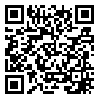Volume 17, Issue 2 (Vol 17,No.2, Summer 2021 2021)
irje 2021, 17(2): 204-214 |
Back to browse issues page
Download citation:
BibTeX | RIS | EndNote | Medlars | ProCite | Reference Manager | RefWorks
Send citation to:



BibTeX | RIS | EndNote | Medlars | ProCite | Reference Manager | RefWorks
Send citation to:
Shali M, Ghorbani A, Matourypour P, Salehi Morkani E, Salehpoor Emran M, Nikbakht Nasr Aadi A. Exploring Nurses' Experiences of Coping Mechanisms Used in COVID-19 Pandemic: A Qualitative Study. irje 2021; 17 (2) :204-214
URL: http://irje.tums.ac.ir/article-1-6998-en.html
URL: http://irje.tums.ac.ir/article-1-6998-en.html
Mahbube Shali * 
 1, Azam Ghorbani2
1, Azam Ghorbani2 
 , Pegah Matourypour3
, Pegah Matourypour3 
 , Ehsan Salehi Morkani4
, Ehsan Salehi Morkani4 
 , Mohammad Salehpoor Emran5
, Mohammad Salehpoor Emran5 
 , Alireza Nikbakht Nasr Aadi6
, Alireza Nikbakht Nasr Aadi6 


 1, Azam Ghorbani2
1, Azam Ghorbani2 
 , Pegah Matourypour3
, Pegah Matourypour3 
 , Ehsan Salehi Morkani4
, Ehsan Salehi Morkani4 
 , Mohammad Salehpoor Emran5
, Mohammad Salehpoor Emran5 
 , Alireza Nikbakht Nasr Aadi6
, Alireza Nikbakht Nasr Aadi6 

1- Assisstant Professor, Depatement of Critical Care Nursing and Nursing Management, School of Nursing and Midwifey, Tehran University of Medical Sciences, Tehran, Iran
2- PhD in Nursing, Depatement of Medical/Surgical Nusing, School of Nursing and Midwifey, Tehran University of Medical Sciences, Tehran, Iran
3- Assisstant Professor, Depatement of Medical/Surgical Nusing, School of Nursing and Midwifey, Tehran University of Medical Sciences, Tehran, Iran
4- BS in Nusing, Intensive Care Unit(ICU), Esabne Maryam Hospital, Isfahan Univesty of Medical Sciences, Isfahan, Iran
5- MSc Student in Nursing, Department of Community Health Nursing, School of Nursing and Midwifery, Tehran University of Medical Sciences, Tehran, Iran
6- Professor Dean, Depatement of Medical/Surgical Nusing, School of Nursing and Midwifey, Tehran University of Medical Sciences, Tehran, Iran
2- PhD in Nursing, Depatement of Medical/Surgical Nusing, School of Nursing and Midwifey, Tehran University of Medical Sciences, Tehran, Iran
3- Assisstant Professor, Depatement of Medical/Surgical Nusing, School of Nursing and Midwifey, Tehran University of Medical Sciences, Tehran, Iran
4- BS in Nusing, Intensive Care Unit(ICU), Esabne Maryam Hospital, Isfahan Univesty of Medical Sciences, Isfahan, Iran
5- MSc Student in Nursing, Department of Community Health Nursing, School of Nursing and Midwifery, Tehran University of Medical Sciences, Tehran, Iran
6- Professor Dean, Depatement of Medical/Surgical Nusing, School of Nursing and Midwifey, Tehran University of Medical Sciences, Tehran, Iran
Abstract: (1708 Views)
Background and Objectives: It is necessary to apply appropriate coping methods to reduce destructive physical and psychological effects of stress during Covid-19 pandemics. This study was conducted to explore nurses' experiences of stress coping techniques during the Covid-19 pandemic.
Methods: The present study used a qualitative methodology with interpretive phenomenology method. Purposive sampling was used. The participants, including nurses working in hospitals affiliated to Tehran University of Medical Sciences, shared their experiences through in-depth, individual and semi-structured interviews. The transcripts of interviews were analyzed based on the Dickelmann's approach using the MAXQDA 12 software.
Results: The participants included nine nurses (six females and three males) with a mean age of 45 ± 5.3 years. The results of data analysis showed four main categories and fifteen subcategories conceptually named based on their nature. The main categories were self-support, family shelter, hospital support umbrella, and community support on both extremes.
Conclusion: The participants practiced different coping strategies to deal with stress and anxiety. In addition to individual mechanisms, nurses sought help from other sources of support, such as family, workplace, and community. Based on the experiences of nurses participating in the study, it is recommended to teach nursing staffs coping methods with stress, especially in times of crisis such as the Covid-19 pandemic.
Type of Study: Research |
Subject:
Epidemiology
Received: 2021/11/24 | Accepted: 2021/09/21 | Published: 2021/09/21
Received: 2021/11/24 | Accepted: 2021/09/21 | Published: 2021/09/21
| Rights and permissions | |
 |
This work is licensed under a Creative Commons Attribution-NonCommercial 4.0 International License. |



